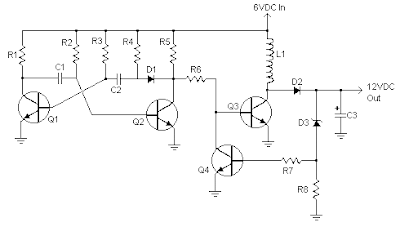This is the Simple 6 VDC to 12 VDC Converter Circuit Diagram. With this circuit, you can doubled the input voltage of 6V DC to become 12V DC output voltage.
Simple 6 VDC to 12 VDC Converter Circuit Diagram
Component Parts:
R1, R4 = 2.2K
R2, R3 = 4.7K
R5 = 1K
R6 = 1.5K
R7 = 33K
R8 = 10K
C1,C2 = 0.1uF
C3 = 470uF/25V
D1 = 1N914
D2 = 1N4004
D3 = 12V 400mW Zener Diode
Q1, Q2, Q4 = BC547
Q3 = BD679
L1 See Notes
Circuit Notes:
1. L1 is a custom inductor wound with about 80 turns of 0.5mm magnet wire around a toroidal core with a 40mm outside diameter.
2. Different values of D3 can be used to get different output voltages from about 0.6V to around 30V. Note that at higher voltages the circuit might not perform as well and may not produce as much current. You may also need to use a larger C3 for higher voltages and/or higher currents.
3. You can use a larger value for capacitor C3 to provide better filtering.
4. The circuit will require about 2A from the 6V supply to provide the full 800mA at 12V.
Simple 6 VDC to 12 VDC Converter Circuit Diagram
Component Parts:
R1, R4 = 2.2K
R2, R3 = 4.7K
R5 = 1K
R6 = 1.5K
R7 = 33K
R8 = 10K
C1,C2 = 0.1uF
C3 = 470uF/25V
D1 = 1N914
D2 = 1N4004
D3 = 12V 400mW Zener Diode
Q1, Q2, Q4 = BC547
Q3 = BD679
L1 See Notes
Circuit Notes:
1. L1 is a custom inductor wound with about 80 turns of 0.5mm magnet wire around a toroidal core with a 40mm outside diameter.
2. Different values of D3 can be used to get different output voltages from about 0.6V to around 30V. Note that at higher voltages the circuit might not perform as well and may not produce as much current. You may also need to use a larger C3 for higher voltages and/or higher currents.
3. You can use a larger value for capacitor C3 to provide better filtering.
4. The circuit will require about 2A from the 6V supply to provide the full 800mA at 12V.







0 comments:
Post a Comment